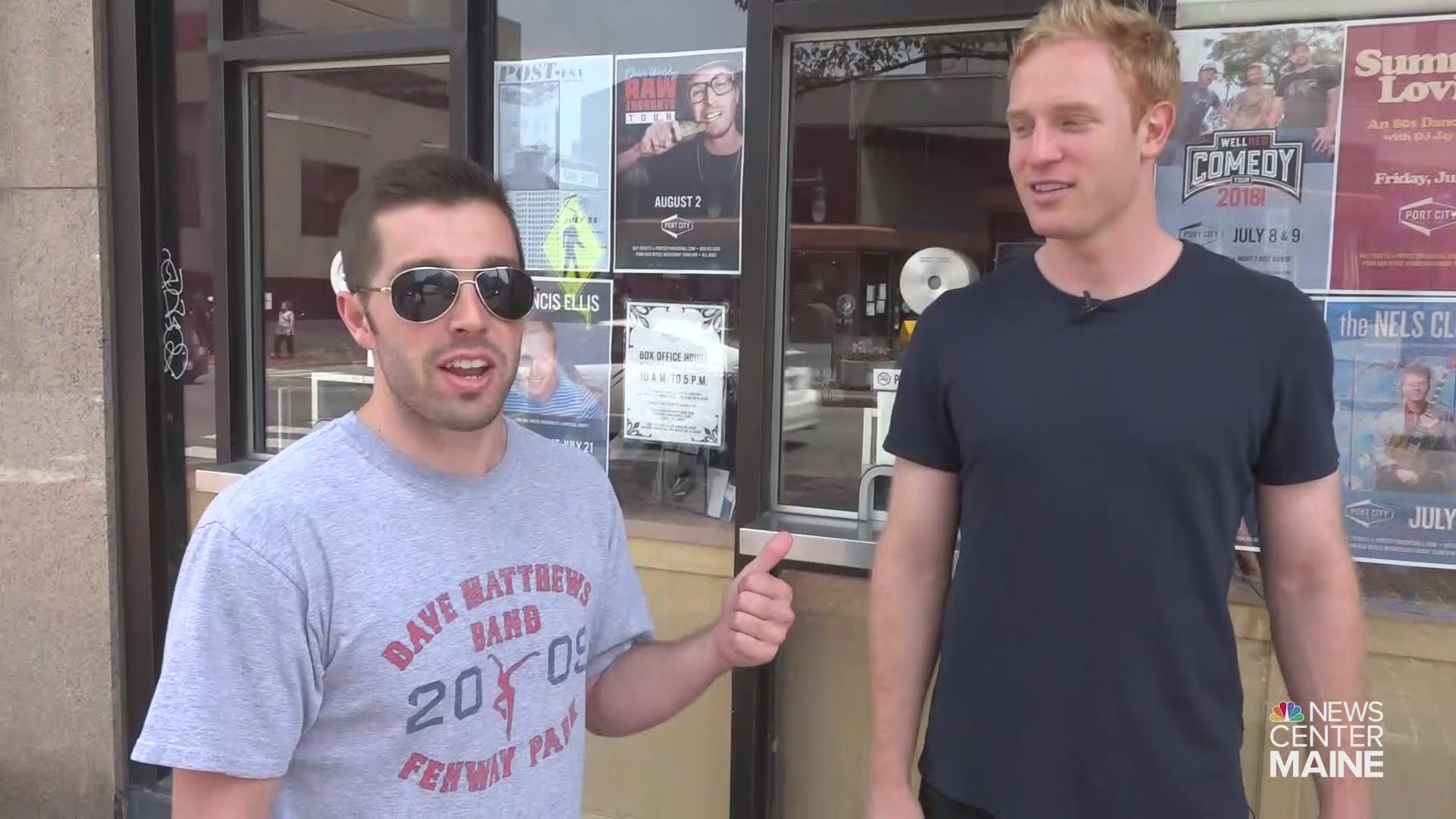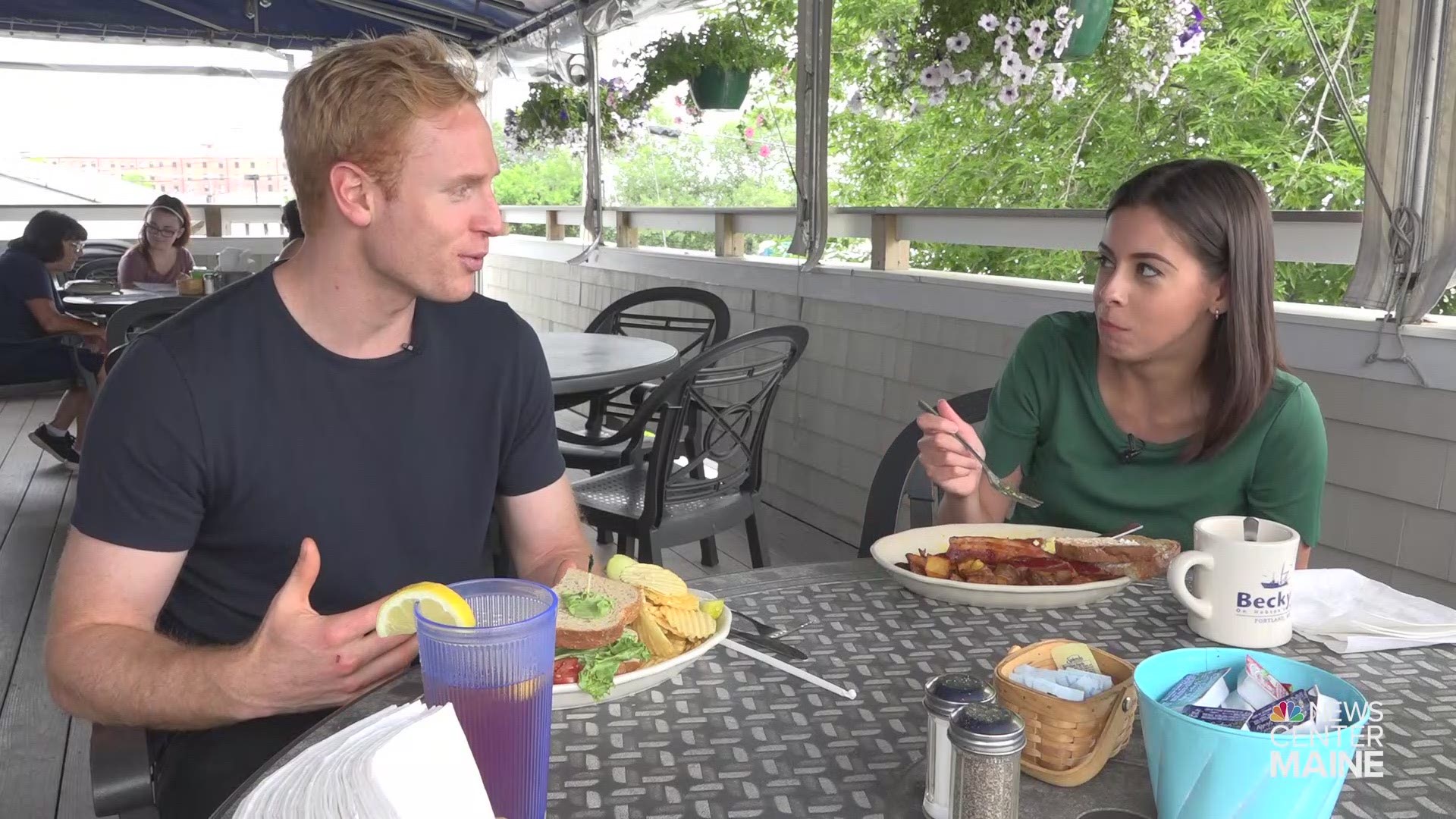FREEPORT (NEWS CENTER Maine) -- At 6’3” and 215 lbs. with a booming voice to match, Freeport native Francis Ellis is hard to miss. The stand-up comedian is even more conspicuous now that he found unlikely success at Barstool Sports as a personality for the controversial media giant, and as co-host for their morning satellite radio show, Barstool Breakfast. Ahead of his first homecoming stand up show in Portland July 21, we had a Barstool Breakfast of our own, talking with Ellis about why he thinks people should change their mind about Barstool Sports given their history, what he believes Maine needs to retain young professionals, and much more.
Below is an edited version of our conversation for condensing purposes.
You started at Barstool last year, right?
I’ve been there a year and a half now. Two Januarys ago.
Okay. You had a rough start.
It’s sort of the way it always happens at Barstool. You go through this initiation process, and in the first month, I certainly thought, ‘I’m not gonna make it.’ I really didn’t like it. But then you sort of find your way and live behind your work. You try to keep a low profile, then if you just keep plugging away and putting out good work, people accept you and get behind you.
Tell me a little bit about Barstool Breakfast.
We started Barstool Breakfast in January when we got our own channel on Sirius XM. Willie Colon (Pittsburgh Steelers, New York Jets) and I now run the show, and we have a great rapport. It’s amazing how easily our chemistry was built, even from day one. He’s one of my best friends, and it’s bizarre because you got a 360 lb. black guy and a far more... well, me. Somehow we found a middle ground. It’s like two opposite extremes connecting over a shared love of sports and drinking, stuff like that.
In your ‘Behind the Blog’ segment, you talk about how difficult it has been to put yourself out there and have all of these trolls and people slamming you online. Maine is very low key. Talk about what it was like coming from a state like this and being thrust into an environment like that.
I grew up in this beautiful state of ours on the water with small-town values, kind of knowing everybody. You just know everybody. Then I moved to New York after college and became a standup comedian, and that’s its own scene. But once you get to Barstool, you have a level of exposure that you’ve never had anywhere in your life, and your entire life is put out there to be dissected and spoken about. There are forums about it and all this stuff. Frankly, I don’t think I’m particularly that interesting. Why would anyone want to talk about me?
Why would I set up an interview at Becky’s Diner to talk to you about you?
Well yea, right? It speaks to the incredible popularity of Barstool and how much it’s grown, and sort of the cult following that it has especially in the northeast. So it was a really interesting transition for me to get thrust into the fire, and you have to toughen up your skin very quickly. You sort of put up armor. As I said in the ‘Behind the Blog’ thing with Kevin, the byproduct of that unfortunately is, now I’m very devoid of sentiment and feel like I’ve closed myself off emotionally. And while it helps me put up armor against the attacks, it also numbs me to any positive feedback or advancements.
Barstool is not shy of controversy. How would you pitch Barstool to Jack in Houlton?
For me, Barstool has changed so much in the last year-and-a-half, even since I have been there. Ever since the Chernin Group acquired 51% of the company, they consolidated everyone in New York City under one roof and turned it into more of a multimedia company that does radio, podcasting and videos and all that stuff, beyond just sports blogging and whatnot. We’ve hired a female CEO, a fantastic CEO, Erika Nardini. There’s a real admiration and respect for the co-ed nature in the direction of Barstool now. And I would like to think that some of the soundbites, or the jokes that have lived from Barstool's 14-year history, are an outdated snapshot of where the company is now. We talk about politics now. We’ve diversified in a big way in trying to become more progressive, and that’s a natural thing. It’s cool, while also retaining our “common man” mentality and sort of the unabashed, unapologetic tones that brought us to where we are.
Definitely has “cleaned up” over the last even five years, like you said.
I’d like to say cleaning up is a little bit misleading because it’s not necessarily that it cleaned up. Because Dave and a number of guys still put forth the same, real strong takes that they’ve always had. I think we just grew up a little bit. You’ll find the sports and the humor and the stuff that is beloved by, let’s say, the frat audience. But there’s also options for everybody. It’s a menu that services a lot of different people. We have a political podcast now, we have some fantastic female writers. This new woman Kate, who is a Marine, does a lot of funny stuff, but also talks about the military. We have all kinds of people who, depending on what your tastes are, you can probably find something to connect with. There’s like 130 pieces of content put out a day on the website. So if you’re really reading every single piece, you’re a crazy person who has no job. Choose what you want to consume. Cater the website to your own taste.
Maine struggles to have people like us stay in Maine: young professionals who want to settle down here. What do you think the state needs to retain people like you instead of finding success elsewhere?
I’d have to do a little research, but I think a lot of it starts with education. Obviously, we have some fantastic colleges — Bowdoin, Bates, Colby, UMaine, USM, all of that. But where are those people going? Why are they leaving? Because in Boston, so many of those graduates stay. I’ll speak to my profession. As a comedian, there’s not enough standup here. There’s no club. There used to be a club, I think it was called The Comedy Connection. It’s where Bob Marley came up. If I wanted to be a comedian in Maine, I’d have to drive to Boston most nights to perform. As a comedian in New York, I can get up on two or three shows a night, bouncing around the city. That’s just not possible here. So I would need to see a comedy club here that had nightly shows before I could even consider coming back.
So more places of opportunity to grow.
Exactly. You have massive acts doing State Theater and Merrill Auditorium. I can’t even draw at those places. I’m doing Port City Music Hall which has a capacity of 300. But I couldn’t touch those other places.
Comedy wasn’t always the dream for Ellis the way it may have been for other comics. He said he used his high school lacrosse career to get into the best college he could, which ended up being Harvard University.
Did I see you studied government?
Yea, I studied government with a focus on the Arab world, especially Saudi Arabia. I had a thought for a little bit that I might go into the state department and try to work for the foreign service like NSA, CIA, etc.
Get out. Really?
Yea, I was very interested in, like, the geopolitics of the Arab world. As I was there, the Arab Spring was happening and the whole world was kind of catching fire. Very interested in the Israeli-Palestinian conflict. I had some fantastic professors in that realm so I just kind of gravitated to those subjects.
I feel like that’s such a little known fact. You wanted to be a government employee.
Sure, but I think my perception of what I wanted to do professionally has shifted. It was always a fluid landscape. After school for a couple years, I tried to do the comedy thing, didn’t think I was gonna get anywhere. Then I started applying to law school and got a job working for the district attorney’s office in NYC. I got into Fordham and decided I wanted to go there for four days. I was at law school for four days and said, 'This is way too hard. This is not for me.' I wasn’t ready to give up on being a comedian. I withdrew and it was the best decision I’ve ever made.
What got you into comedy?
You always see comedians asked that question and they’ll always say they’ve always wanted to be a comedian their whole lives. I think I did without knowing it because when Napster came out when I was in like, middle school, all my friends are downloading music and I’m just downloading full-on albums of comedy. Lewis Black, Eddie Murphy, Richard Pryor, George Carlin. And that was what I would listen to at night. Then I read Steve Martin’s autobiography Born Standing Up, and that’s when I thought, ‘Wow. That sounds awesome. I wanna try that.' And I’ve always loved performing, but I never knew if I could do standup. I got a job my junior summer in college as an intern in finance. I hated it so much. I was so bored that I would spend my whole day jotting down little jokes notes on a pad at my desk. And by the time I got back to school senior year, I had 20 minutes of material and I had no idea if it was funny or not. So I thought, ‘I might as well try it out.’ I organized a show, a bunch of my friends came. I was terrible. But they laughed, and I was kind of hooked.


